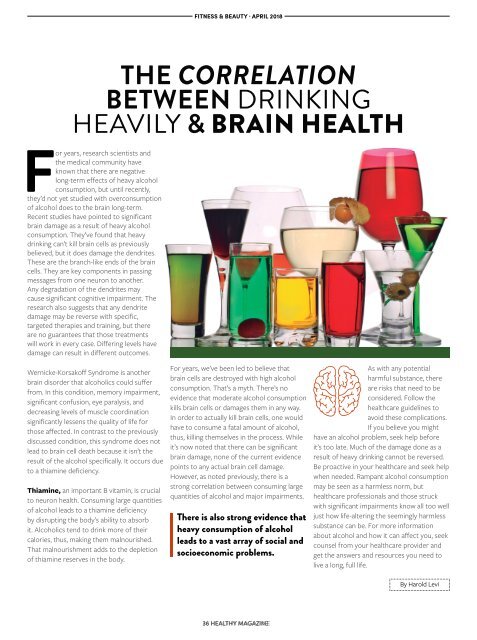Healthy RGV Issue 113
Create successful ePaper yourself
Turn your PDF publications into a flip-book with our unique Google optimized e-Paper software.
FITNESS & BEAUTY · APRIL 2018<br />
For years, research scientists and<br />
the medical community have<br />
known that there are negative<br />
long-term effects of heavy alcohol<br />
consumption, but until recently,<br />
they’d not yet studied with overconsumption<br />
of alcohol does to the brain long-term.<br />
Recent studies have pointed to significant<br />
brain damage as a result of heavy alcohol<br />
consumption. They’ve found that heavy<br />
drinking can’t kill brain cells as previously<br />
believed, but it does damage the dendrites.<br />
These are the branch-like ends of the brain<br />
cells. They are key components in passing<br />
messages from one neuron to another.<br />
Any degradation of the dendrites may<br />
cause significant cognitive impairment. The<br />
research also suggests that any dendrite<br />
damage may be reverse with specific,<br />
targeted therapies and training, but there<br />
are no guarantees that those treatments<br />
will work in every case. Differing levels have<br />
damage can result in different outcomes.<br />
Wernicke-Korsakoff Syndrome is another<br />
brain disorder that alcoholics could suffer<br />
from. In this condition, memory impairment,<br />
significant confusion, eye paralysis, and<br />
decreasing levels of muscle coordination<br />
significantly lessens the quality of life for<br />
those affected. In contrast to the previously<br />
discussed condition, this syndrome does not<br />
lead to brain cell death because it isn’t the<br />
result of the alcohol specifically. It occurs due<br />
to a thiamine deficiency.<br />
Thiamine, an important B vitamin, is crucial<br />
to neuron health. Consuming large quantities<br />
of alcohol leads to a thiamine deficiency<br />
by disrupting the body’s ability to absorb<br />
it. Alcoholics tend to drink more of their<br />
calories, thus, making them malnourished.<br />
That malnourishment adds to the depletion<br />
of thiamine reserves in the body.<br />
For years, we’ve been led to believe that<br />
brain cells are destroyed with high alcohol<br />
consumption. That’s a myth. There’s no<br />
evidence that moderate alcohol consumption<br />
kills brain cells or damages them in any way.<br />
In order to actually kill brain cells, one would<br />
have to consume a fatal amount of alcohol,<br />
thus, killing themselves in the process. While<br />
it’s now noted that there can be significant<br />
brain damage, none of the current evidence<br />
points to any actual brain cell damage.<br />
However, as noted previously, there is a<br />
strong correlation between consuming large<br />
quantities of alcohol and major impairments.<br />
There is also strong evidence that<br />
heavy consumption of alcohol<br />
leads to a vast array of social and<br />
socioeconomic problems.<br />
As with any potential<br />
harmful substance, there<br />
are risks that need to be<br />
considered. Follow the<br />
healthcare guidelines to<br />
avoid these complications.<br />
If you believe you might<br />
have an alcohol problem, seek help before<br />
it’s too late. Much of the damage done as a<br />
result of heavy drinking cannot be reversed.<br />
Be proactive in your healthcare and seek help<br />
when needed. Rampant alcohol consumption<br />
may be seen as a harmless norm, but<br />
healthcare professionals and those struck<br />
with significant impairments know all too well<br />
just how life-altering the seemingly harmless<br />
substance can be. For more information<br />
about alcohol and how it can affect you, seek<br />
counsel from your healthcare provider and<br />
get the answers and resources you need to<br />
live a long, full life.<br />
By Harold Levi<br />
36 HEALTHY MAGAZINE
















